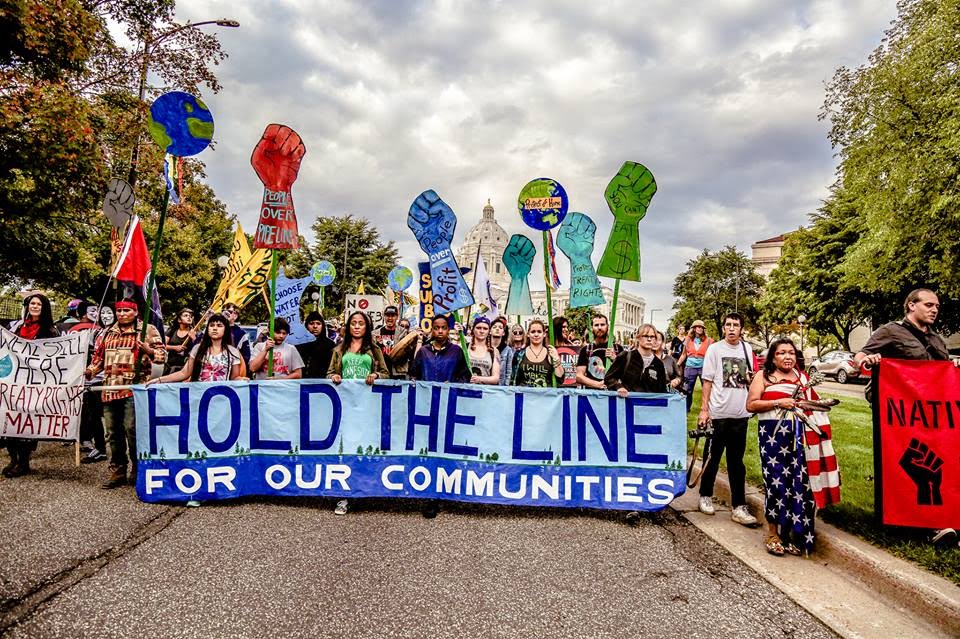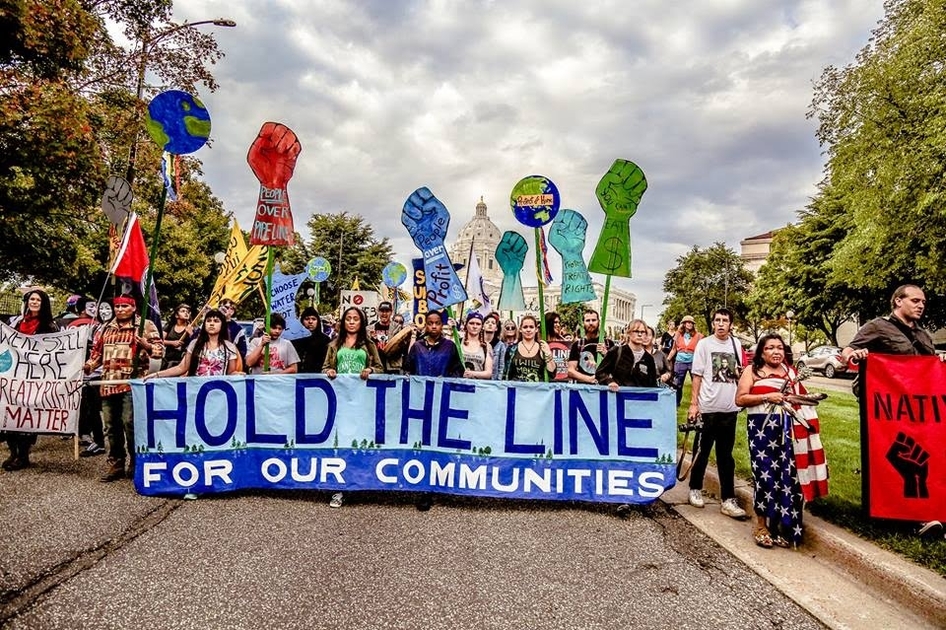This case study was co-written by Ruth Breech of RAN and Tara Houska, National Campaigns Director of Honor the Earth for our latest bank report card, Banking on Climate Change: Fossil Fuel Finance Report Card 2018.

Minnesota Rally Against Line 3, October 2017. PHOTO: Rob Wilson
Enbridge’s Line 3 so-called “replacement” project is a proposal for a new pipeline that would cover more than 1,000 miles from Hardisty, Alberta to Superior, Wisconsin,1 transporting an average of 760,000 barrels of crude oil from the Alberta tar sands each day, with capacity for 844,000 barrels per day.2
Enbridge intends to abandon its existing Line 3 pipeline if it is able to complete its new Line 3, leaving the corroding pipe in the ground and a lasting legacy of contamination. The replacement Line 3 would take a brand new route. This path cuts through pristine wetlands and watersheds in northern Minnesota, passing through the headwaters of the Mississippi River to the shores of Lake Superior, through the heart of Minnesota’s lake country and some of the largest and most productive wild rice beds in the world.3
The proposed new Line 3 pipeline poses a grave threat to Indigenous rights and culture. Its route would pierce the heart of the 1855 Treaty territory, where members of signatory Ojibwe bands retain the rights to hunt, fish, harvest wild rice, conduct religious ceremonies, and travel.4 Wild rice harvesting lies at the core of Ojibwe culture, and is explicitly defined as a right in the treaties of several bands of Ojibwe with the U.S. government. The five directly impacted Ojibwe tribes along the Minnesota portion of the proposed route are opposed to the project: the White Earth Band of Ojibwe, Mille Lacs Band of Ojibwe, Fond du Lac Band of Lake Superior Chippewa, Red Lake Band of Ojibwe, and Leech Lake Band of Ojibwe. The Line 3 pipeline project carries risks that would violate the treaty rights of the Ojibwe peoples. Harm to the wild rice beds of the Ojibwe people in this area threatens irrevocable and devastating cultural impacts.
Enbridge has fought the environmental review process every step of the way, leading to a courtroom battle that ultimately resulted in the Minnesota Court of Appeals mandating a full Environmental Impact Statement (EIS). At the end of 2017, the Minnesota Public Utilities Commission (PUC) found Enbridge’s EIS to be inadequate, citing several issues that required further clarity. When Enbridge argued that the inadequate EIS was sufficient for the reviewing judge to make her final decision on the project, the judge disagreed. However, the PUC ended up overturning the judge’s ruling in favor of Enbridge’s arguments against including a full EIS in the ultimate project decision.5
In January 2018, the five directly impacted Ojibwe bands joined forces to appeal the decision of the Minnesota PUC to exclude a full cultural resources survey from Line 3’s EIS. The tribes’ legal brief documents that “the state’s historic properties work on the Line 3 Replacement project… to date has been so inadequate that it could be used as a ‘what not to do’ example in future guidance.”6 The PUC rejected the appeal of tribal and environmental groups, denying the inclusion of a cultural survey in its final decision of approving or rejecting the pipeline based on the EIS. The cultural survey must be completed before construction can start in Minnesota, but won’t have any impact on the PUC’s decision.7
Despite the fact that Minnesota has not finalized the legal, public or environmental permitting process for Line 3, and that the state’s Department of Commerce has deemed the existing Line 3 in addition to the new Line 3 unnecessary,8 Enbridge has already started construction on either end of the new pipeline in Wisconsin and Canada.9 A growing number of Water Protectors have used lockdowns to delay construction on the 14-mile stretch in Wisconsin, and are creating additional encampments along the pipeline route, marking the beginning of a sustained direct action campaign from Indigenous groups and their allies.10
The Treaty Alliance Against Tar Sands Expansion, comprised of more than 150 First Nations and Tribes,11 stands in committed opposition to Line 3, and to all tar sands pipelines crossing their traditional lands and waters,12 calling for an international campaign to divest from any financial institution that funds tar sands pipelines.13 And yet, banks like TD, RBC, MUFG, and Citi remain leading bankers of Enbridge.14 In October, Wells Fargo led a syndicate of more than a dozen banks in renewing a credit facility of $1.48 billion for the company, despite a coalition of 15 Indigenous and environmental groups detailing the human rights and environmental impacts of the Line 3 pipeline.15
To learn more about Honor the Earth’s work and how you can help stop Line 3:
1. “Line 3 Replacement Program,” Enbridge, accessed 1 September 2017.↩
2. Mike Hughlett, “Enbridge’s New Pipeline Across Northern Minnesota Not Needed, State Says,” Star Tribune, 11 September 2017. ↩
3.“Natural Wild Rice in Minnesota,” Minnesota Department of Natural Resources, 15 February 2008. ↩
4. “Stop Line 3,” accessed 1 September 2017.↩
5. Mike Hughlett, “PUC Moves Enbridge Line 3 Decision to June,” Star Tribune, 9 January 2018. ↩
6. “Joint Tribal Petition to Reconsider and Amend the PUC’s December 14 Order,”before the Minnesota Office of Administrative Hearings for the Minnesota Public Utilities Commission, pp. 1 and 5. ↩
7. Mike Hughlett, “Minnesota Regulators Turn Down Tribal Request that Could Delay Enbridge Pipeline Project,” StarTribune, 22 February 2018. ↩
8. After Extensive Review, Minnesota Commerce Department Releases Expert Analysis and Recommendation on the Certificate of Need for Enbridge’s Proposed Line 3 Oil Pipeline Project Minnesota Commerce Department, 11 September 2017.↩
9. Juris Graney, Construction Starts on Enbridge Line 3 Pipeline Replacement From Hardisty to Wisconsin Edmonton Journal, 3 August 2017; Elizabeth McMahon and Danielle Kaeding, “Enbridge’s Line 3 Replacement Underway In Wisconsin,”Wisconsin Public Radio, 26 July 2017.↩
10. Brady Slater, “Enbridge Pipeline Protesters Lock Down Site in Wisconsin,” West Fargo Pioneer, 14 September 2017.↩
11. “Treaty Alliance First Nations and Tribes Warn That There Will Be No New Tar Sands Pipelines,” Treaty Alliance Against Tar Sands Expansion, 11 August 2017.↩
12. “Treaty Alliance Against Tar Sands Expansion” Treaty Alliance Against Tar Sands Expansion, accessed 20 May 2017.↩
13. “Mazaska Talks” Mazaska Talks, accessed 20 May 2017. ↩
14. Bloomberg Finance L.P.↩
15. “Line 3 Letter” Honor the Earth et al., September 2017.↩
